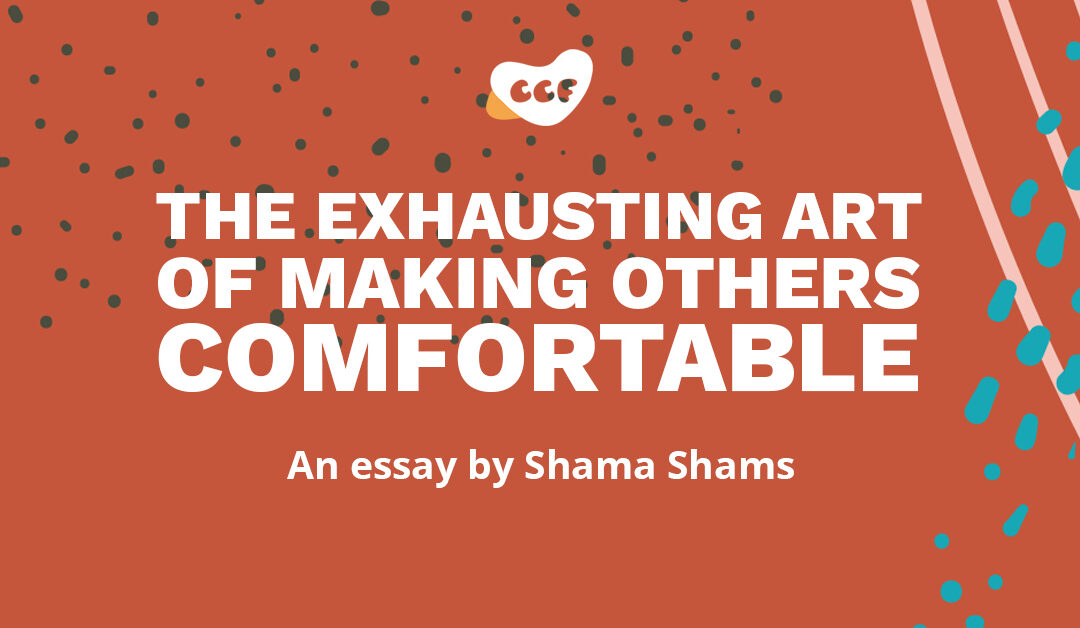By Shama Shams, CFRE, a nonprofit executive, writer, and storyteller with over 20 years of experience in fundraising and leadership
Let me be clear: making white folks comfortable is a full-time job. One we didn’t apply for, weren’t hired to do, and shouldn’t be expected to carry.
In the late 1970s, when my family immigrated to the United States, we were encouraged—strongly encouraged—to assimilate. This went beyond learning English or adapting to a new way of life. We were expected to shed parts of ourselves: our cultural attire, our spices, our mother tongue, even our names. The whiter we looked and sounded, the more we were told we would be accepted.
So, we tried. We folded our saris into storage bins. We swallowed our accents and mimicked the cadence of American speech. We adopted behaviors, fashion, and food that felt foreign because that was the price of belonging—or so we thought.
But no matter how much we bent ourselves; we were never fully accepted. Tolerated, maybe. Tokenized, often. But truly embraced? Rarely.
Today, we talk about diversity, equity, and inclusion like they are cornerstones of progress. But the reality is that those words are increasingly being whitewashed.
They are smoothed over, repackaged, and stripped of their weight to make sure they don’t ruffle feathers.
Suddenly, naming racism is seen as divisive. Talking about power and privilege is “too political.” And those of us with lived experience are being asked, once again, to soften our voices to keep others comfortable.
Let me be clear: making white folks comfortable is a full-time job. One we didn’t apply for, weren’t hired to do, and shouldn’t be expected to carry.
This is not new. Historically, white-dominated systems have wielded the deprivation of basic human needs—housing, food, healthcare, and legal protection—as a tool to enforce political, racial, and social agendas.
Those of us working in the nonprofit sector are once again navigating the chilling effects of political fear tactics. The threat of funding cuts for using language that is not sanctioned by the current administration is not simply about semantics—it’s about silencing truth and stripping communities of their dignity. This is not new. Historically, white-dominated systems have wielded the deprivation of basic human needs—housing, food, healthcare, and legal protection—as a tool to enforce political, racial, and social agendas.
Now, we’re seeing that history repeat itself in real time.
The Trump administration’s decision to terminate federal funding for legal services to unaccompanied migrant children is one such egregious example. This policy change effectively ends government support for legal representation for nearly 26,000 children who entered the United States without a parent or guardian. Without legal counsel, these vulnerable minors—many of whom have fled violence, poverty, or persecution—face expedited deportation, often without fully understanding their rights or the legal processes in front of them.
This move doesn’t just defund a program—it dismantles a critical safety net for children and families of color. It sends a message that the lives and futures of nonwhite individuals, particularly migrants, are expendable. These are not isolated policy shifts; they are part of a larger, dangerous pattern of marginalization that aims to suppress advocacy, silence truth-tellers, and dismantle systems of care rooted in justice and equity.
Nonprofit organizations must remain vigilant. We are not just service providers—we are protectors of human rights. And we cannot afford to be silent when those rights are under attack.
I am an immigrant.
A daughter of a Muslim man, named Mohammad.
My mother tongue is Bangla—the language of poets, revolutionaries, and resilience.
I have spent years trying to mold myself into something easier for others to digest. But I no longer have the energy or desire to make myself small for someone else’s peace of mind.
If my existence makes you uncomfortable, know this: your existence—when it perpetuates racism, when it demands silence from the oppressed, when it expects assimilation as the price of admission—makes me uncomfortable too.
What makes me uncomfortable is walking into rooms where I have to prove my worth.
What makes me uncomfortable is being asked to represent my race, my culture, my religion—while others get to simply be.
What makes me uncomfortable is racism—subtle or loud, institutional or interpersonal.
We didn’t come to this country to disappear. We didn’t cross oceans and borders just to vanish into your comfort zone. We came to live, to contribute, to build, and to belong.
But true inclusion doesn’t begin with comfort.
It begins with truth. With discomfort. With the willingness to confront what has been broken for far too long.
So no, I won’t whitewash my story to make it easier to hear.
And if that makes you uncomfortable—maybe it’s time to sit with that.
When we lean into discomfort with open hearts and curious minds, we become more capable of seeing the full humanity in others—and in doing so, we become better advocates, better allies, and better people.
Lean into discomfort—it’s often the first step toward meaningful growth. Rather than shying away, use it as a vehicle to explore, reflect, and evolve. Discomfort isn’t inherently negative; it simply signals that you’ve encountered something unfamiliar, something outside your norm. That moment of unease is an invitation—to expand your worldview, challenge your assumptions, and stretch beyond the borders of what’s comfortable.
Start with your own story. Take time to learn about your heritage. You may discover that you are only a few degrees removed from an immigrant journey, a story of sacrifice, displacement, resilience, or reinvention. These connections often reveal themselves when we take the time to listen—not just to others, but to where we come from.
In my work in the nonprofit sector, I’ve had the privilege of engaging with people whose lives are radically different from my own. They don’t look like me, speak like me, or live like me. Their stories are shaped by poverty, trauma, systemic injustice, and sometimes, by sheer chance. To honor those stories—to truly tell them with integrity—I have to approach each interaction with humility and curiosity. I have to be willing to dive deep, to sit in discomfort, and to listen without the filter of judgment.
Not every life I encounter is one I would choose for myself, but that’s not the point. These are not lives that require my approval—they require my empathy. Some circumstances are born out of hardship, others from generational cycles or systemic neglect. Understanding doesn’t always mean agreement, but it always demands compassion.
When we lean into discomfort with open hearts and curious minds, we become more capable of seeing the full humanity in others—and in doing so, we become better advocates, better allies, and better people.
I believe that empathy lies at the core of Diversity, Equity, Inclusion, and Accessibility (DEIA). When we strip away the politics, performative checkboxes, and coded language that too often cloud these conversations, what remains is a deeply human need—the desire to feel seen, valued, and like we truly belong.
DEIA is not just a strategic initiative or a compliance measure; it’s about recognizing our shared humanity. It’s about creating spaces where people don’t have to shrink themselves to fit in but instead are celebrated for who they are.
Empathy invites us to listen without defensiveness, to acknowledge experiences beyond our own, and to act with compassion and accountability. At its best, DEIA work reconnects us to one another, reminding us that inclusion isn’t about losing power—it’s about making room for everyone at the table.

Shama Shams
Sanjukta (Shama) Shams, CFRE (she/her) is a nonprofit executive, author, speaker, and podcast host with over 20 years of experience in fundraising, storytelling, and leadership. As Chief Impact Officer at Uplift Northwest, she champions workforce development and community empowerment. She teaches nonprofit storytelling and fundraising at Seattle-area colleges and hosts From Passion to Purpose, amplifying nonprofit leaders’ voices. Follow Shama on LinkedIn.
Discover more from CCF
Subscribe to get the latest posts sent to your email.

